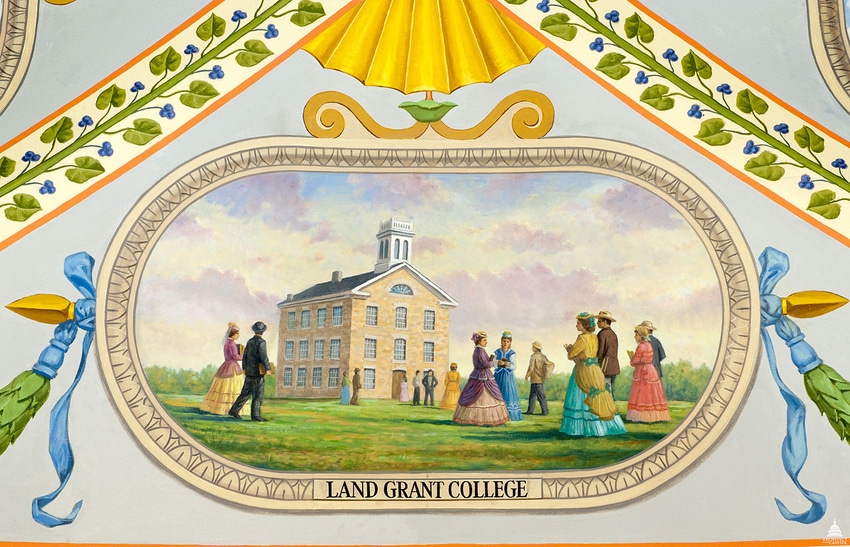Morrill Act of 1862 has arguably prevented many people from going hungry, but that doesn't count for much to groups like PETA2, which wants to undermine the historical land-grant mission.
April 17, 2017

*Dr. Nevil Speer is based in Bowling Green, Ky., and serves as vice president of U.S. operations for AgriClear Inc., a wholly owned subsidiary of TMX Group Ltd. The views and opinions of the author expressed herein do not necessarily state or reflect those of TMX Group Ltd. and Natural Gas Exchange Inc.
The Feedstuffs headline read: “JBS USA, CSU Establish New Global Food Innovation Center.” The headline referred to a major project now underway at Colorado State University (CSU): the construction of a new meat science building on campus — largely made possible through a $7.5 million donation from JBS USA.
The center will be named in honor Dr. Gary Smith and his wife Kay Smith and is being established for the purpose of teaching, industry outreach and research. The facility will include a culinary kitchen, demonstration area and retail meat/dairy store. Last, the new building includes educational space designed by CSU professor Temple Grandin to enable students to learn proper animal handling and welfare in a hands-on setting.
Being a CSU alumnus, the recent announcement certainly caught my attention. It's gratifying to see CSU's meat science program have the opportunity to design and build a new state-of-the-art facility. Moreover, both Drs. Smith and Grandin have had a profound, positive influence on the industry. Their recognition is highly appropriate.
More broadly, establishment of the new center is an important element towards CSU fulfilling its foundational mission. It's important to remind ourselves that CSU is a land-grant institution. As such, it was established by the Land-Grant College Act of 1862 (otherwise known as the Morrill Act, with Justin Smith Morrill having been the primary congressional sponsor), which provided tracts of land to states to finance the creation of colleges specializing in “agriculture and the mechanic arts.”
The purpose, and successful outcome, of the Land-Grant Act is (and always has been) twofold (at a minimum). One, it enabled individual states to more readily make higher education available to rural communities. Two, it provided an organized structure for education, research and extension around applied science — namely, agriculture.
Congress, in 1862, didn't take food security for granted, and the introduction of the Morrill Act fundamentally changed the world and has arguably prevented many people from going hungry across the globe.
But for some, that historical mission doesn't count for much. Enter PETA2 — self-defined as “the largest youth animal rights group in the world (that) exists for young people just like you who want to start making meaningful changes for animals in their everyday lives.”
“Hannah” (apparently, PETA2 doesn't believe in last names) serves as the organization's college campaign coordinator. Hannah's headline, in response to the CSU announcement, was: “A Slaughterhouse Next to a Library?! WTF, CSU?”
Her worry seems to be that CSU's meat science center will include a slaughter facility — and that the building will be located near the university's Morgan Library.
That apparently would prove a hardship for students. As Hannah notes: “So gross, right?! People don't want to walk past a murder house on their way to go study. I mean, studying is already hard enough — let's not make it even more unappealing. ... Not only will the presence of a slaughterhouse be psychologically traumatizing for students, it'll also be dangerous and unsanitary.”
Give PETA2 some credit: They're good at frivolous drama. Hannah further suggests that CSU do the following: (1) build the slaughterhouse with glass walls, (2) put cameras in the facility and (3) give mandatory tours to all meat eaters.
Without knowing for sure, I'd surmise that Hannah thinks those suggestions are something new and/or resistance points from the meat industry. Clearly, she's not familiar with some of Dr. Grandin's best work: the Glass Walls Project, sponsored by the American Meat Institute.
PETA2 is actively advocating a petition directed to CSU president Tony Frank to stop the new project. At press time, the petition had received nearly 7,500 electronic signatures. Those efforts are in direct opposition to CSU's historical mission. Moreover, if such a petition proved successful, the next stop would likely be some effort to undermine the entire animal science program. That's not only true at CSU but at all other land-grant institutions as well.
None of this is new; it's merely a continuation of an ongoing trend on many college campuses. That's best articulated by Truth In Food's 2014 College Initiative Program. Lesson 1 from the initiative: Agriculture is often presented as the culprit in today's social ills.
That campus trend is concerning (something I've written about previously), but it won't be solved overnight. In the meantime, the food industry needs to counter with a supportive petition letting CSU president Frank know the importance of the land-grant system and CSU's role within the broader mission. I can think of lots of great hashtags for a campaign, but my favorite thus far is #CSUGlobalFoodInnovation.
One last item of importance here. It turns out that Hannah — our college campaign coordinator — is not even a student at CSU or any other university. Worse yet, she's not even a Colorado resident. She's based in Norfolk, Va.
But IF Hannah were a student at CSU and was truly traumatized by all this, I'm confident a non-land-grant institution would welcome her application. In the end, that might prove a better fit for everyone concerned.
About the Author(s)
You May Also Like


.png?width=300&auto=webp&quality=80&disable=upscale)
